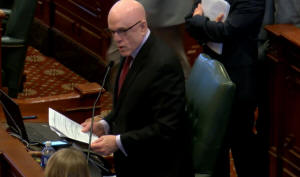Some worry guaranteed income programs will ‘buy votes,’ disincentivize
work
 Send a link to a friend
Send a link to a friend
 [April 15, 2022]
By Greg Bishop | The Center Square [April 15, 2022]
By Greg Bishop | The Center Square
(The Center Square) – Some question whether
taxpayer-funded guaranteed income programs set to start across the state
will be successful.
Chicago is accepting applications later this month for the city’s $31.5
million program meant to give $500 a month to 5,000 eligible residents.
The income threshold is under $57,000 a year for a family of three.
As part of the state budget approved by lawmakers, there also is a $3.6
million guaranteed income pilot program for the Metro East area in East
St. Louis.
“You’ve seen these around the country,” Illinois House Majority Leader
Greg Harris, D-Chicago, said during a committee hearing last week. “It
is a small program in a specific locale to test the outcomes of
delivering guaranteed income to a small subset of people as opposed to
the patchwork of them trying to get other sources of income through
[Supplemental Nutrition Assistance Program] or [Temporary Assistance for
Needy Families] or the earned income tax credit.”
Details of the Metro East program have yet to be revealed and are
expected to be developed by the Illinois Department of Human Services.

Wirepoints President Ted Dabrowski worries such programs at taxpayer
expense will do more harm than good.
“People should be incentivized to go look for work, not to not look for
work,” Dabrowski told WMAY. “This kind of thing I think is destructive,
it puts people out of the workforce if they become reliant on it.”
[to top of second column]
|

Rep Greg Harris, D-Chicago, on the House
floor Thursday, May 31, 2018.
Image courtesy of BlueRoomStream

The group Economic Security for Illinois said in position statements
posted online that direct cash payments to households help keep millions
of Americans out of poverty. They argue direct payments don't replace
work, it supplements it.
“Cash gives families the immediate opportunity to meet their most
immediate needs and save for the future,” the group argues.
Dabrowski said such payments could take away from targeted financial
support for food or energy and those who really need help.
“That means you take away money from elderly, to give to young,”
Dabrowski said. “You take money away from people who are disabled and
you give it to the able bodied.”
He’s also suspicious of the idea, saying it may lead to unnecessary
waste and abuse, and could impact elections.
“They don’t really work,” Dabrowski said. “It’s just I think another
good marketing tool, sadly, of being able to hand out money and get more
votes.”
Greg Bishop reports on Illinois government and other
issues for The Center Square. Bishop has years of award-winning
broadcast experience and hosts the WMAY Morning Newsfeed out of
Springfield.
 |